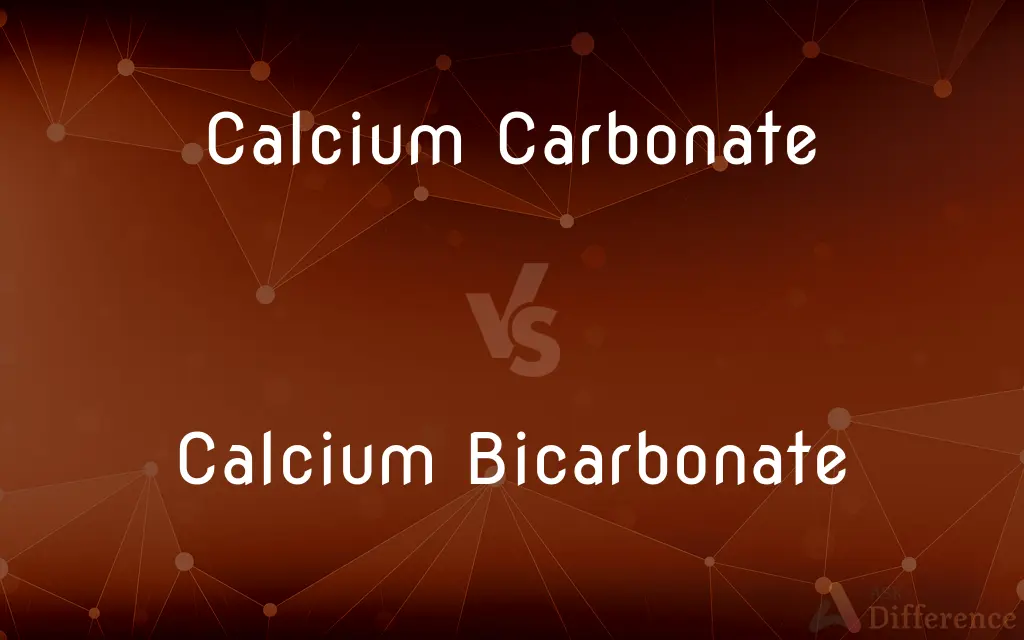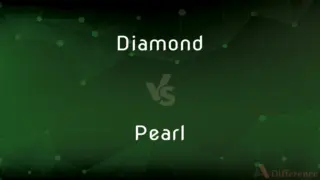Calcium Carbonate vs. Calcium Bicarbonate — What's the Difference?
By Tayyaba Rehman — Published on November 3, 2023
Calcium Carbonate is a stable, solid compound found in rocks and shells. Calcium Bicarbonate is a soluble compound formed in water containing calcium, carbon dioxide, and bicarbonate ions.

Difference Between Calcium Carbonate and Calcium Bicarbonate
Table of Contents
ADVERTISEMENT
Key Differences
Calcium Carbonate and Calcium Bicarbonate are both calcium salts, but they have distinct characteristics and origins. Calcium Carbonate, represented chemically as CaCO₃, is a naturally occurring compound. It is commonly found in rocks, particularly limestone, and is the primary component of shells of marine organisms, snails, and eggshells. On the other hand, Calcium Bicarbonate does not exist as a solid but forms in solution when calcium, water, carbon dioxide, and bicarbonate ions interact.
Calcium Bicarbonate, unlike Calcium Carbonate, cannot be isolated in a solid form. Instead, it's often found in groundwater where limestone is present, as the water moves through the limestone and picks up calcium and bicarbonates from the rock. When water containing Calcium Bicarbonate is exposed to the air, carbon dioxide is released, and the calcium bicarbonate reverts back to calcium carbonate, precipitating out of solution.
One of the primary uses of Calcium Carbonate is as an antacid, due to its ability to neutralize stomach acid. It is also used as a dietary calcium supplement or as an ingredient in agricultural lime for soil treatment. Calcium Bicarbonate, being a soluble form of calcium in many freshwater sources, plays a crucial role in providing essential calcium to aquatic life and also contributes to the hardness of water.
In summary, while both Calcium Carbonate and Calcium Bicarbonate relate to calcium and have carbonate ions, their properties, physical state, and applications differ notably. Calcium Carbonate is solid, stable, and widespread in nature, whereas Calcium Bicarbonate is soluble, transient, and forms in specific aqueous conditions.
Comparison Chart
Chemical Formula
CaCO₃
Ca(HCO₃)₂
ADVERTISEMENT
Physical State
Solid
Soluble in water
Natural Occurrence
Rocks, shells
Groundwater with limestone
Stability
Stable and can be isolated
Cannot be isolated as a solid
Application
Antacids, dietary supplement, soil treatment
Contributes to water hardness, essential for aquatic life
Compare with Definitions
Calcium Carbonate
A common antacid used for stomach upset.
Many over-the-counter antacids contain Calcium Carbonate.
Calcium Bicarbonate
A soluble compound formed in calcium-rich water.
Groundwater near limestone often contains Calcium Bicarbonate.
Calcium Carbonate
The primary component of shells and eggshells.
Shells are durable due to their Calcium Carbonate composition.
Calcium Bicarbonate
A compound that cannot be isolated in a solid form.
Unlike Calcium Carbonate, you won't find solid Calcium Bicarbonate.
Calcium Carbonate
A naturally occurring compound found in rocks.
Limestone is rich in Calcium Carbonate.
Calcium Bicarbonate
Transforms to Calcium Carbonate upon carbon dioxide release.
When exposed to air, water with Calcium Bicarbonate will form Calcium Carbonate deposits.
Calcium Carbonate
A compound used to neutralize acidic soil.
Farmers use Calcium Carbonate to treat acidic fields.
Calcium Bicarbonate
Responsible for water hardness in many freshwater sources.
Calcium Bicarbonate contributes to the hard feeling of some tap water.
Calcium Carbonate
A dietary supplement for calcium.
Calcium Carbonate tablets can help maintain bone health.
Calcium Bicarbonate
Essential for providing calcium to aquatic life.
Fish in hard water benefit from the Calcium Bicarbonate content.
Common Curiosities
What is Calcium Carbonate commonly found in?
Calcium Carbonate is commonly found in rocks, especially limestone, and in shells.
Is Calcium Bicarbonate present in solid form?
No, Calcium Bicarbonate cannot be isolated as a solid and is soluble in water.
Why can't we get solid Calcium Bicarbonate?
Calcium Bicarbonate is unstable in solid form and exists in solution.
How does Calcium Bicarbonate contribute to water properties?
Calcium Bicarbonate contributes to the hardness and calcium content of water.
Is chalk made of Calcium Carbonate?
Yes, chalk is primarily composed of Calcium Carbonate.
Is Calcium Carbonate used in antacids?
Yes, Calcium Carbonate is a common ingredient in antacids.
Can Calcium Carbonate be used as a dietary supplement?
Yes, Calcium Carbonate is often used as a dietary calcium supplement.
Where is Calcium Bicarbonate commonly found?
It is often found in groundwater, especially near limestone formations.
Are eggshells composed of Calcium Carbonate?
Yes, eggshells are primarily made up of Calcium Carbonate.
Does Calcium Bicarbonate affect aquatic life?
Yes, it provides essential calcium to aquatic life in freshwater sources.
Is the presence of Calcium Bicarbonate in water permanent?
No, it can revert to Calcium Carbonate upon exposure to the atmosphere.
What happens to Calcium Bicarbonate when exposed to air?
It releases carbon dioxide and transforms back into Calcium Carbonate.
How is Calcium Carbonate formed from Calcium Bicarbonate?
When water containing Calcium Bicarbonate is exposed to air, it reverts to Calcium Carbonate.
Can Calcium Carbonate neutralize acid?
Yes, Calcium Carbonate can neutralize acids and is used as an antacid and in agriculture.
Is Calcium Carbonate safe to consume?
Yes, in regulated amounts, it's used as a dietary supplement and antacid.
Share Your Discovery

Previous Comparison
Unmarried in Marital Status vs. Single in Marital Status
Next Comparison
Diamond vs. PearlAuthor Spotlight
Written by
Tayyaba RehmanTayyaba Rehman is a distinguished writer, currently serving as a primary contributor to askdifference.com. As a researcher in semantics and etymology, Tayyaba's passion for the complexity of languages and their distinctions has found a perfect home on the platform. Tayyaba delves into the intricacies of language, distinguishing between commonly confused words and phrases, thereby providing clarity for readers worldwide.












































